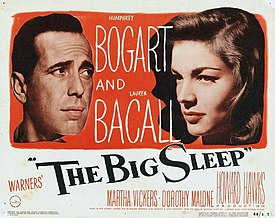THE BIG SLEEP (1946)
Directed by Howard Hawks
Warner Brothers, 114 minutes, Not-rated.
★★★★
Raymond Chandler is among the most famous hardboiled detective fiction authors in American history. It was either his good fortune or curse–depending on your point of view–to have his 1939 debut novel made into a Hollywood movie. From the moment The Big Sleep hit the screen, Humphrey Bogart owned the role of private detective Philip Marlowe. This film is now regarded as both a film noir classic and one of the very best within that genre.
I’m not sure that I buy that assessment–the film version of Chandler’s novel was both tamed to comply with Hays Office censors and is often hard to follow–but there’s no denying its grit or the chemistry between Bogart and Lauren Bacall, who plays the role of Vivian Sternwood Rutledge. Speaking of the Hays Office, her sister and father bear the surname Sternwood. Vivian is divorced, but that’s scarcely mentioned as the subject was semi-taboo, so Hawks and a scriptwriting crew that included William Faulkner, simply wrote around it.
The Big Sleep is labyrinthian at times in part because it’s as much a pastiche of character studies as a murder mystery. Marlowe first appears at the Sternwood mansion to visit General Sternwood (Charles Waldron), who wants Marlowe to intervene in a mess involving his younger daughter Carmen (Martha Vickers). She has racked up considerable gambling debts with a bookseller named Geiger and there are also some incriminating photos of her being used by another lowlife, Joe Brody (Louis Jean Heydt) to extort money from the general. (In the novel, Brody’s a porn dealer and Carmen has been photographed nude.) Oddly, though, General Sternwood seems more interested in the whereabouts of Sean Regan, a missing associate he’s been grooming. (Regan’s storyline lacks depth in the movie.)
Again, The Big Sleep is more about characters than linear plotlines, but what a collection of on-the-razor’s-edge toughs and wannabe toughs they are. Carmen is a piece of work to say the least. She cavorts with gangsters, parties hard, and is as moral as a rabbit in mating season. The first time she sees Marlowe she does everything except rip his pants off, though Marlowe sees her as the bad news she is and has eyes for her older sister Vivian. It seems our surly detective finds Vivian’s tart tongue and bad attitude a much more seductive form of foreplay than short skirts, home-hither glances, and sex kitten purring that would make Lolita blush.
What’s going on? Don’t ask the dame who runs Geiger’s bookstore/front (Dorothy Malone). She’s furtive, and she too likes the cut of Marlowe’s jib. The plot thickens when Geiger is murdered and Marlowe pulls a drugged Carmen from Geiger’s home just before the cops arrive. Liberties are taken with details, but in any Chandler novel the corpses tend to pile up. Carmen’s driver also meets him maker and it seems that all of the lowlife punks have connections to a bigger one, Eddie Mars (John Ridgely). Eddie has other axes to grind. His wife Mona (Peggy Knudsen) ran off with Regan. Somehow everything connects, though the only one that you can follow without your note cards is the connection forged between Marlowe and Vivian. As in all the best screen romances, though, theirs is a series of attract-repel dances.
Bogart and Bacall redeem what might otherwise have been a head-scratching film. As you might have inferred, the script is often muddier than a mutt rolling on a riverbank, but it’s easy to overlook in a film in which Bogart defined Philip Marlowe and Bacall embodied steaminess and exhaled cool air. As in most noir films, certain outcomes are dictated by the production code enforced by the Hays Office. Nonetheless, there is a rather surprise turnabout as the film draws to a close.
Even though I’d judge The Big Sleep as a cut below a masterpiece, it is essential viewing for anyone interested in film noir. It certainly looks the part in that it’s a lot more shadow than sunlight. You’ll also see how strong leads can compensate for script inconsistencies. And maybe you’ll learn that a big literary reputation (Faulkner) doesn’t always trump a great pulp writer (Chandler).
Rob Weir




No comments:
Post a Comment